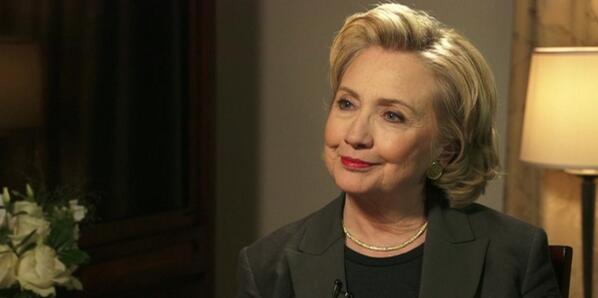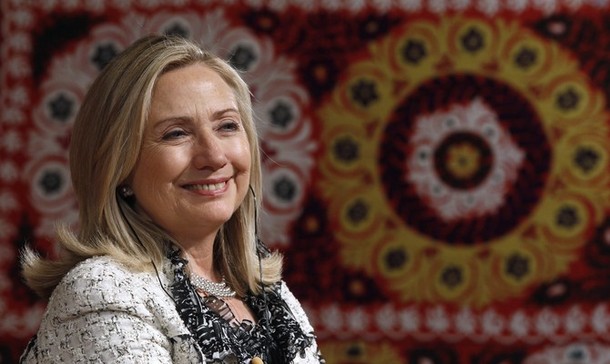Interview With Indira Lakshmanan of Bloomberg News
Interview
Hillary Rodham Clinton
Secretary of State
Ismaili Center
Dushanbe, Tajikistan
October 22, 2011
Please attribute the following content to an interview with Bloomberg News
QUESTION:
Secretary Clinton, thank you so much for making the time to join us on
Bloomberg Radio. You’ve just come from Pakistan, where you, the chairman
of the Joint Chiefs, and the CIA director delivered a clear message to
the Pakistanis that they have to wipe out terrorist safe havens now. The
Pakistanis said that they’ve decided to seek peace talks with militants
before expanding military operations. Did you change their minds?
SECRETARY CLINTON:
Well, I don’t think there’s a contradiction here, which is why, as you
recall, in Afghanistan I said we want to do three things: fight, talk,
and build. And we don’t see those as sequenced; we see them as
simultaneous. Obviously, the more we talk and we think it’s heading in
the right direction, the less we’ll have to fight. So I don’t think that
there is any difference in the goals that we share with Pakistan. They
have a big set of challenges because over 30 years, these terrorist
groups have taken up safe havens inside their country. We have
challenges because they launch attacks across the border against Afghans
and us. And they know, the Pakistanis, that attacks are launched
against them from the Afghan side of the border.
What I wanted to
do with a coordinated U.S. Government presence was to make it very clear
that we have to heighten and deepen our cooperation and our planning.
We do agree on 90 to 95 percent of what needs to be done, but we haven’t
really sat down and had the kind of in-depth conversations that we
began in Pakistan to say okay, what’s first, second, and third? Now, if
you’re in – if you’re sitting in Pakistan, you say we have to prevent
the safe havens from being places where attacks are launched against
Afghanistan, but we have to figure out a way to do it that doesn’t cause
chaos in our own country. We appreciate and respect that. So that’s why
we’re trying to work through the details of the next steps we take
together.
QUESTION: Well, the U.S. has said, you have said clearly, you want to fight and talk at the same time.
SECRETARY CLINTON: Yes.
QUESTION:
The Pakistanis seem to only want to talk, at this point, with the
militants. So what’s the price they’re going to pay in Washington if
they don’t fight insurgents in tribal areas? Will there be a cutoff in
aid, or cross-border attacks from Afghanistan?
SECRETARY CLINTON:
But there are different ways of fighting besides overt military action,
and I think this is an important point of clarification. We have asked
the Pakistanis to squeeze the Taliban and the Haqqani Network. We
recognize that, given their resources, it would be difficult for them to
launch military action at this time. But what we can do is make sure we
are totally synced up on all intelligence, to intercept and prevent
attacks from – emanating from these safe havens. We can go after
funding. We can go after couriers. We can do a lot together that will
interrupt their abilities.
Take what they have helped us do with
al-Qaida. Because of intelligence sharing and mutual cooperation, we
have targeted three of the top al-Qaida operatives since bin Ladin’s
death. That could not have happened without Pakistani cooperation. So
fighting is not just about battalions of forces moving. It is about
using all of our assets effectively to try to squeeze and shut them
down.
QUESTION: Okay. Well, it’s been years that
the same the message from the U.S. for the spy services in Pakistan not
to support insurgents. You said this time there’s no good terrorists and
bad terrorists. So is this Pakistan’s last chance? And what happens to
them if they don’t do what the U.S. needs? What’s the price?
SECRETARY CLINTON:
Well, I’m not – I have made it clear that there will be dire
consequences for Pakistan as well as Afghanistan if this threat from the
terrorist networks is not contained, at the very least, because there’s
no way that any government in Islamabad can control these groups. This
is an opportunity, while we are still with 48 nations across the border
in Afghanistan, where we have a lot of assets that we can put at their
disposal, for us to work to really limit the threat posed by these
groups. They understand that.
Now, I’m not going to go to what
consequences or actions we would be taking, because there’s a lot that
we’re doing that is not necessarily publicly acknowledged or known. But I
will say this: I think, following our conversations and the clarity
that I believe was created, there’s a much greater understanding and
appreciation of what we can do together to deal with these mutual
threats.
QUESTION: Did you tell them that the U.S. might have to launch cross-border attacks from Afghanistan?
SECRETARY CLINTON: There’s a lot going on that is aimed at these safe havens, and we will continue to work with them on that.
QUESTION:
Okay. You acknowledged for the first time that the U.S. had a meeting
with the Haqqani faction of the Taliban this summer at the request of
Pakistan’s spy service to see if there was any hope for reconciliation. A
few months later, the same Haqqanis staged a 19-hour assault on the
U.S. Embassy in Kabul, attacked a U.S. post in the west of Afghanistan. A
suicide bomber killed – posing as a peace negotiator killed
Afghanistan’s top peace envoy. Why even bother with peace talks when the
efforts have gone nowhere since the U.S. embraced this strategy early
last year?
SECRETARY CLINTON: Well, I’m a student
of peace processes. And they often go nowhere for a very long time.
(Laughter.) And that’s why it takes the level of patience and
persistence that we’re willing to invest in order to determine what’s
real and what’s not. And from our perspective, we are exploring. We’re
not committed on any track or with anyone until we get more bona fides
that this is a process worth pursuing. But remember, we have
consistently said we will support an Afghan-led and owned process.
President Karzai, even after the terrible assassination of Professor
Rabbani – which was probably by the Qaeda Shura, not by the Haqqanis,
but six of one, half dozen of the others in terms of the death and
destruction they try to inflict – but even President Karzai, in my
meetings with him in Kabul, has said, look, we have to go forward to
explore what is possible, and we cannot do it unless Afghanistan,
Pakistan, and the United States are all working together.
So this
is going to be a bumpy process. I don’t know any peace process that
hasn’t been a bumpy process. So we’re going to test and we’re going to
probe, and we’ll see where it leads.
QUESTION: In
Libya this week, you urged the new leaders to embrace transitional
justice for perpetrators of crimes from the previous regime. You told
ordinary Libyans to refrain from score settling. Two days later, Qadhafi
was killed in what may have been a summary execution. How can the U.S.
celebrate the killing – a killing that goes against American values,
that everyone get a fair trial? And what does this say about the future
for a democratic Libya under rule of law?
SECRETARY CLINTON:
Well, first, I would not accept the word “celebrate.” I think there was
an acknowledgement, and certainly a recognition, that this was a
pathway to seeing what kind of steps toward democracy the Libyan people
will be able to take. I was pleased to hear the TNC say they will launch
a full investigation into Qadhafi’s death. I think that’s very
important. It sends the right signal that we can’t start on a path
toward democracy, rule of law, human rights without trying to understand
and hold accountable anyone who acted in a way that violates those
precepts. And the international community, too, wants to see the results
of such an investigation. So I do appreciate what the TNC said.
QUESTION:
Last question, on Iran: What moves is the U.S. taking and pushing its
allies to take to punish the regime for the plot against the Saudi
ambassador? And what real leverage do you have on a government that you
yourself has said is turning into a military dictatorship?
SECRETARY CLINTON:
Well, I think this has damaged Iran in the eyes of many countries.
There is a real growing awareness that Iranian interference in the
internal affairs of many countries, and particularly the actions of the
so-called Qods Force, poses threats to individuals and institutions that
have to be looked at and evaluated, which is a big step for us because
we know that Iran has been trying to gain influence, spread its message,
whatever form it takes, around the world. And people have been kind of
indifferent. Well, so what if they’re building a big embassy? So what if
it’s stocked with Qods forces, spies, and all the rest of that? That’s
not about us; that’s about the ongoing conflict between the United
States and Iran. No, guess what? It is about you.
QUESTION: You’re talking about Latin America here.
SECRETARY CLINTON:
Oh, Latin America, Africa, the Middle East, Asia, you name it. And so
we have had a full court diplomatic press to make sure, number one,
people know that these are well founded, provable accusations; number
two, that they – that everybody needs to be more diligent and vigilant
in dealing with Iran because their motives and actions are not always
benign, shall I say; and that number three, the sanctions were imposed
need to be enforced. And so we are looking to manage this in a way that
lays the groundwork for further cooperation in the future.
QUESTION: But we’re not going beyond sanctions at this point?
SECRETARY CLINTON:
No. No, I think – and even sanctions, we’ve got a lot of sanctions
already in place. What we want to do is convince people that behavior
like this is why we need to enforce the sanctions we have. Now, the
United States has imposed more sanctions. The European Union has imposed
more sanctions. We’re talking to other countries about doing it. But we
see this as a part of a long-term effort to raise the alarm about
Iranian actions and intentions.
QUESTION: Secretary Clinton, thank you so much for your time today.
SECRETARY CLINTON: Thank you, Indira. Good to see you. Back on the road again.








